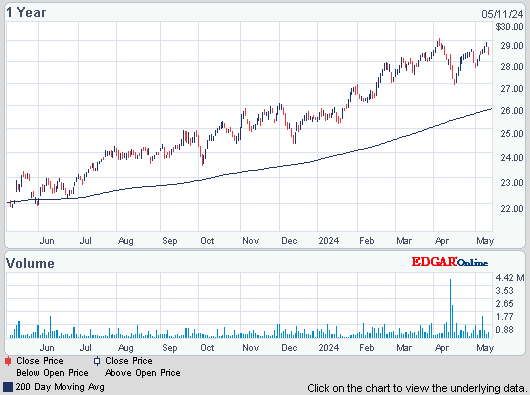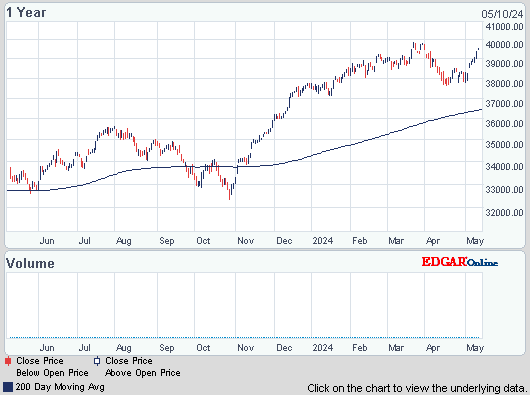Dow was off 114, advancers ahead of decliners 4-3 & NAZ inched up 1. The MLP index rose 1+ to the 457s & the REIT index was about even at 279. Junk bond funds were lower & Treasuries were flattish in a week that saw buying. Oil pulled back in the PM while gold finally found a few buyers.
AMJ (Alerian MLP Index tracking fund)

![Live 24 hours gold chart [Kitco Inc.]](http://www.kitco.com/images/live/gold.gif)


Photo: Bloomberg
Consumer sentiment held close to a 6-year high in Jun as higher home values gave Americans more reason to be optimistic about the economy. Thomson Reuters/University of Michigan said its final confidence index for this month eased to 84.1, higher than forecasted, from 84.5 at the end of May. The measure of the economic outlook climbed to an 8-month high. An improving housing market is sustaining sentiment & making up for the hit to household wealth from a recent setback in stock prices. Further strides in employment & housing will help provide more fuel for an economy beset in Q2 by federal budget cuts. The index has been out of sync with other regional factory reports, surging in May when others pointed to a slump, & dropping this month as measures from the Federal Reserve Banks of New York & Philadelphia point to a rebound.

Photo: Yahoo
Sep could be an opportune time for the Federal Reserve (FED) to consider scaling back its assets purchase, an influential official of the central bank said, as he stressed that the FED must take a long view of economic progress & not be blinded by the most recent data. Governor Jeremy Stein remarks drew attention after he ticked off several examples of improvement in the labor market since the FED launched its bond-buying program last Sep. Stein's speech, & a separate one by Jeffrey Lacker, president of the Richmond Fed, had some parallels to efforts by other officials earlier this week to soothe market anxieties about a pullback in the bond purchases. Nonetheless, the 2 officials showed a more aggressive tone on when the unprecedented policy accommodation might be reduced. Markets had dropped hard in the days after Big Ben said the FED expected to pare back on its bond purchases later this year & to halt it altogether by mid-2014, as long as the economy progresses as expected. But Stein, in an unusual move, trained attention on the FED Sep policy meeting, though the FOMC next meets in Jul. "The best approach is for the committee to be clear that in making a decision in, say, September, it will give primary weight to the large stock of news that has accumulated since the inception of the program and will not be unduly influenced by whatever data releases arrive in the few weeks before the meeting," said Stein. Data from early Sep "will remain relevant for future decisions," even if it does not play a primary role in any policy decision in Sep, he said. "If the news is bad, and it is confirmed by further bad news in October and November, this would suggest that the 7 percent unemployment goal is likely to be further away, and the remainder of the program would be extended accordingly," he said.

Photo: Bloomberg
FED of Richmond President Jeffrey Lacker, who dissented against additional stimulus at every FED meeting last year, predicted financial markets will remain volatile as policy makers debate how & when to curtail the central bank’s asset purchases. “As market participants gain additional insight from the words of Federal Reserve officials or by policy actions in coming quarters, further asset price volatility seems likely,” Lacker said. “This type of volatility is a normal part of the process of incorporating new information into financial asset prices.” The reaction by investors since Bernanke’s comments is “evidence that they had built in expectations of more asset purchases than I think the committee taken as a whole was anticipating,” Lacker said. Recent asset price declines “should not be too surprising,” he said in the speech. Volatility in the $4T-a-day foreign-exchange market as measured by JPMorgan Chase & Co.’s Global FX Volatility Index has jumped 36% in 2013 & touched the highest in a year on Mon. “We’re entering a period now where risks are going to be more two-sided about policy, and I think that’s naturally going to be a period where fixed-income markets are going to be more volatile,” Lacker said. “When tightening becomes closer in time, you’re going to get more fixed-income volatility.” The FED wants to keep 'em guessing about its next move.
Lacker Says Markets to Stay Volatile as Fed Debates Tapering
Stocks wrapped up an outstanding 6 months with a mixed market. As on most Fridays, there was no exciting news to move stocks. But FED officials want to keep everybody guessing about the next moves because they don't have specific plans. Meanwhile, Apple (AAPL), with the largest market cap in the world, managed a modest gain today, but is still below 400 & remains near its lows since the start of 2012.
Dow Jones Industrials

AMJ (Alerian MLP Index tracking fund)
Treasury yields:
U.S. 3-month |
0.03% | |
U.S. 2-year |
0.36% | |
U.S. 10-year |
2.49% |
| CLX13.NYM | ...Crude Oil Nov 13 | ...95.08 |
![Live 24 hours gold chart [Kitco Inc.]](http://www.kitco.com/images/live/gold.gif)


Photo: Bloomberg
Consumer sentiment held close to a 6-year high in Jun as higher home values gave Americans more reason to be optimistic about the economy. Thomson Reuters/University of Michigan said its final confidence index for this month eased to 84.1, higher than forecasted, from 84.5 at the end of May. The measure of the economic outlook climbed to an 8-month high. An improving housing market is sustaining sentiment & making up for the hit to household wealth from a recent setback in stock prices. Further strides in employment & housing will help provide more fuel for an economy beset in Q2 by federal budget cuts. The index has been out of sync with other regional factory reports, surging in May when others pointed to a slump, & dropping this month as measures from the Federal Reserve Banks of New York & Philadelphia point to a rebound.

Photo: Yahoo
Sep could be an opportune time for the Federal Reserve (FED) to consider scaling back its assets purchase, an influential official of the central bank said, as he stressed that the FED must take a long view of economic progress & not be blinded by the most recent data. Governor Jeremy Stein remarks drew attention after he ticked off several examples of improvement in the labor market since the FED launched its bond-buying program last Sep. Stein's speech, & a separate one by Jeffrey Lacker, president of the Richmond Fed, had some parallels to efforts by other officials earlier this week to soothe market anxieties about a pullback in the bond purchases. Nonetheless, the 2 officials showed a more aggressive tone on when the unprecedented policy accommodation might be reduced. Markets had dropped hard in the days after Big Ben said the FED expected to pare back on its bond purchases later this year & to halt it altogether by mid-2014, as long as the economy progresses as expected. But Stein, in an unusual move, trained attention on the FED Sep policy meeting, though the FOMC next meets in Jul. "The best approach is for the committee to be clear that in making a decision in, say, September, it will give primary weight to the large stock of news that has accumulated since the inception of the program and will not be unduly influenced by whatever data releases arrive in the few weeks before the meeting," said Stein. Data from early Sep "will remain relevant for future decisions," even if it does not play a primary role in any policy decision in Sep, he said. "If the news is bad, and it is confirmed by further bad news in October and November, this would suggest that the 7 percent unemployment goal is likely to be further away, and the remainder of the program would be extended accordingly," he said.

Photo: Bloomberg
FED of Richmond President Jeffrey Lacker, who dissented against additional stimulus at every FED meeting last year, predicted financial markets will remain volatile as policy makers debate how & when to curtail the central bank’s asset purchases. “As market participants gain additional insight from the words of Federal Reserve officials or by policy actions in coming quarters, further asset price volatility seems likely,” Lacker said. “This type of volatility is a normal part of the process of incorporating new information into financial asset prices.” The reaction by investors since Bernanke’s comments is “evidence that they had built in expectations of more asset purchases than I think the committee taken as a whole was anticipating,” Lacker said. Recent asset price declines “should not be too surprising,” he said in the speech. Volatility in the $4T-a-day foreign-exchange market as measured by JPMorgan Chase & Co.’s Global FX Volatility Index has jumped 36% in 2013 & touched the highest in a year on Mon. “We’re entering a period now where risks are going to be more two-sided about policy, and I think that’s naturally going to be a period where fixed-income markets are going to be more volatile,” Lacker said. “When tightening becomes closer in time, you’re going to get more fixed-income volatility.” The FED wants to keep 'em guessing about its next move.
Lacker Says Markets to Stay Volatile as Fed Debates Tapering
Stocks wrapped up an outstanding 6 months with a mixed market. As on most Fridays, there was no exciting news to move stocks. But FED officials want to keep everybody guessing about the next moves because they don't have specific plans. Meanwhile, Apple (AAPL), with the largest market cap in the world, managed a modest gain today, but is still below 400 & remains near its lows since the start of 2012.
Dow Jones Industrials











No comments:
Post a Comment